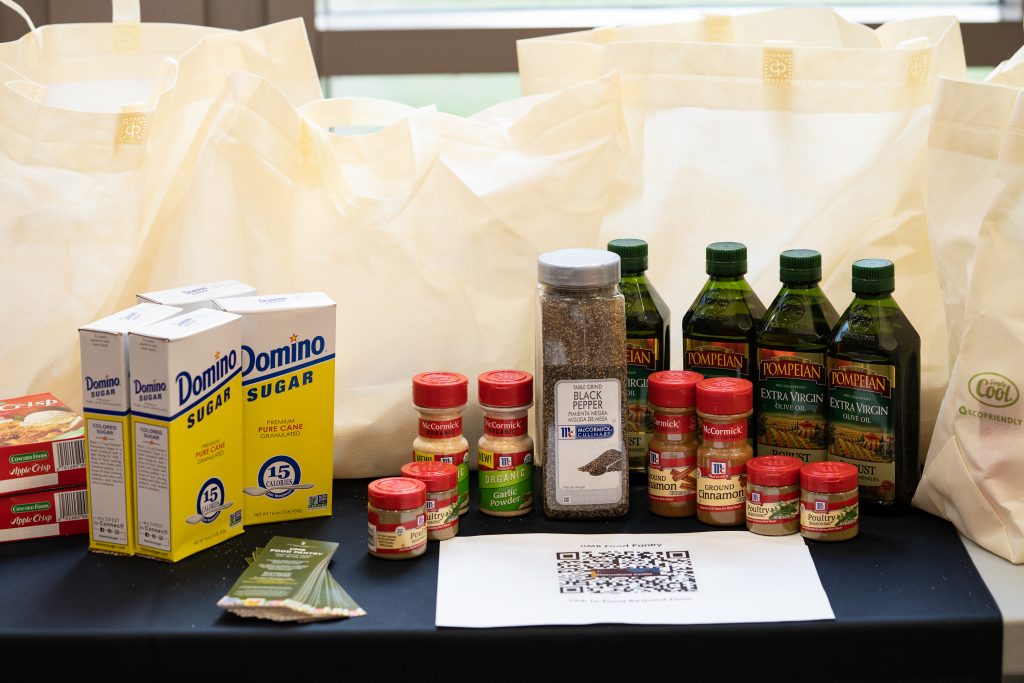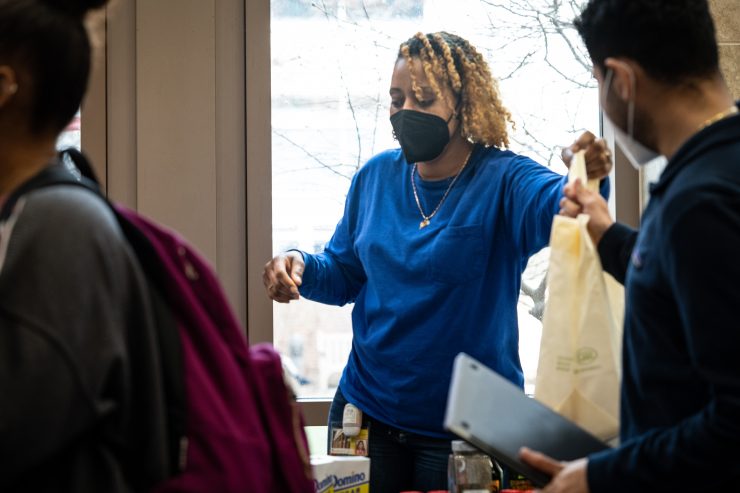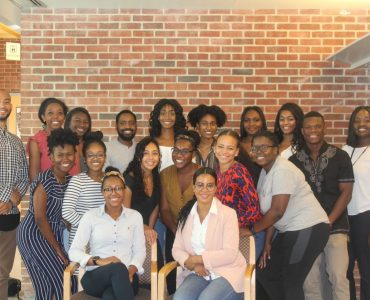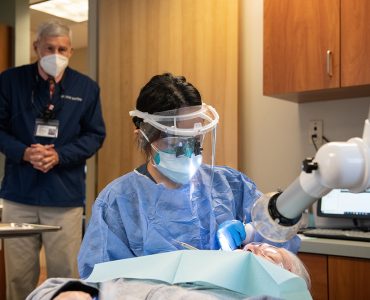Students at the University of Maryland, Baltimore (UMB) have been hit by an economic double whammy over the past two years. The COVID-19 pandemic and a big spike in inflation have caused angst for many students who are trying to study, make ends meet, and put food on their table.
TJ Park, a second-year Doctor of Nursing Practice student at the University of Maryland School of Nursing (UMSON), has felt the pandemic/inflation squeeze, which has increased his feelings of food insecurity.
“I’m definitely more stressed out about how much I spend on my groceries due to inflation,” Park said. “Whenever I see empty sections in the grocery aisle, I’m concerned about whether I am going to have access to food.”
To help combat food insecurity on campus, the Division of Student Affairs launched the UMB Student Pantry in 2021 to provide food to students regardless of need. The pantry is located in the Student Affairs Suite on the third floor of the SMC Campus Center.
Nivedita Hegdekar, MSL, a PhD candidate at the University of Maryland Graduate School, said the pantry is important because many students are struggling with food insecurity.
“We need this especially now during a pandemic and with food prices and grocery bills going up because of inflation,” said Hegdekar, a former president of the University Student Government Association (USGA). “I hope the University does more to provide food for students, because this a really good initiative, and I enjoy taking advantage of it.”
A University of Maryland School of Medicine student who requested anonymity agreed with Park and Hegdekar about the increase in food insecurity.
“I have more stress related to buying groceries, especially since I’m not working,” the student said. “I’ve received items from the UMB Student Pantry, and I appreciate having that resource. I’m excited to see that the pantry is growing.”
Popping Up Around UMB
To deliver food and spread awareness about its services, the Student Pantry has held “pop-up” events around UMB since September 2021. About 50 bags were handed out Feb. 23 at UMSON, March 16 and April 5 at the SMC Campus Center, and April 13 at the University of Maryland Francis King Carey School of Law.

At a typical pop-up pantry, students are greeted with friendly hellos and the chance to take home a bag of food items. The large, eco-friendly bags donated by IKEA have been filled with cans of tuna, crackers, boxes of raisins, water bottles, and fruit cups. Specialty bags also have been created and distributed — for example, meal kits containing the ingredients to make a pasta dish. Through corporate partnerships, the pantry also offers items from Baltimore businesses such as olive oil from Pompeian, sugar from Domino, and spices from McCormick.
“The UMB Student Pantry is relatively new, so these pop-up events help us spread the word,” said Beatriz Mendez, a University of Maryland School of Social Work student and Student Pantry intern. “We want students to know that these food items are accessible to them. Let’s say you forget your lunch, or if you just need a snack, you can grab something from the pantry.”
Courtney Jones Carney, DPA, MBA, executive director, Intercultural Leadership and Engagement, Student Affairs, has a message for students affected by food insecurity: Don’t hesitate to ask for help.
“We’ve heard from students who think their need is not great enough to benefit from the pantry,” said Jones Carney, who also is director of UMB’s Intercultural Center. “There is no particular threshold we are measuring for students to receive these benefits. So if students do not have enough funding to eat or replenish their food supply in a timely manner, we want to make sure they’re taking advantage of these opportunities.”
Jolé Ruff, MSW, coordinator, Intercultural Leadership and Engagement, Student Affairs, said students sometimes have to be coaxed to take a bag — but for altruistic reasons, not in fear of stigma.
“Some students will say, ‘There is someone else who needs this food more than I do,’ so they might be hesitant to take a bag,” said Ruff, who organizes and works at the pop-up events. “We really just want them to know that the pantry is for all students, regardless of need. When they hear that, they are more open to receiving the bags.”
At the pop-up events, students are directed to a flyer with a QR code that launches their smartphones to the UMB Student Pantry request form, which includes categories such as oats and grains; soups, beans, and proteins; canned fruits and vegetables; pastas and sauces; sugar and spices; beverages; and grab-and-go snacks. Hygiene products as well as kosher and Halal food items are available, too. In addition, KN95 masks and COVID-19 tests were acquired from UMB for distribution.
Students can pick up their orders at designated times Monday through Thursday at the SMC Campus Center. Lockers have been installed to provide a confidential and convenient way to pick up food requests during campus center operating hours, which include evenings and weekends.
Fighting Food Insecurity
In a fall 2020 survey of UMB students, 29 percent of respondents indicated they were worried that their food would run out before they got money to buy more; 22 percent indicated the food they bought didn’t last and they didn’t have money to get more; and 33 percent indicated they couldn’t afford to eat balanced meals.
Patty Alvarez, PhD, MS, assistant vice president, Student Affairs, said this data informed UMB’s food insecurity efforts, which have focused on sharing information about food resources with students and creating the Student Pantry.
“Students can use this confidential resource as often as they would like,” Alvarez said. “Our partnership with the Maryland Food Bank, monetary gifts from individuals, financial support from the University Student Government Association, and in-kind contributions from local companies enable us to provide these food resources. The University will continue to address food insecurity to assist students in achieving their goals.”
Student Affairs works in collaboration with programs such as the Hungry Harvest and Baltimore Gift Economy markets at the UMB Community Engagement Center, the University of Maryland Medical Center Farmers Market, local Maryland Food Bank locations, and UMBengaged, a resource that students can use to find events around campus in their area of interest and filter for ones that provide food.
The Office of Philanthropy, which Alvarez calls “an excellent partner in prioritizing the pantry and student success,” has pitched in by setting up the UMB Student Food Insecurity and Emergency Fund. Donors can make a one-time annual gift — UMB employees can use payroll deduction if they wish — ensuring that students like Park can continue to fuel their bodies and minds.
“I enjoy the rice and beans I’ve gotten from the pantry, and I hope they’ll add granola bars to the list,” Park said. “The pantry has been very helpful overall, and I’m thankful that UMB provides this service to students.”
Learn more about student food security at UMB.




